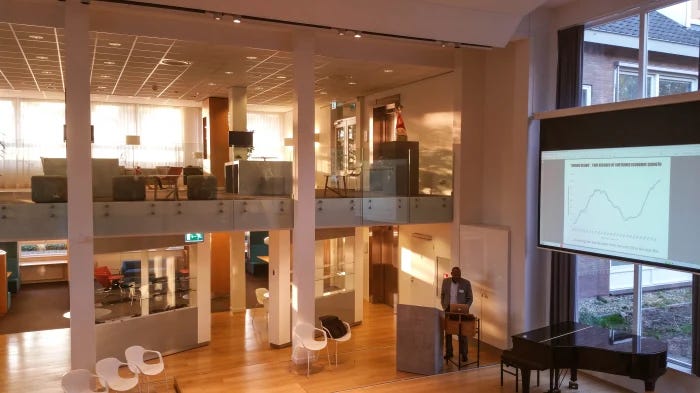More math and science, please
Princeton University professor Leonard Wantchekon was the keynote at the African Economic History Workshop in Wageningen, the Netherlands (31 October 2015)
I had the good fortune last week of meeting Leonard Wantchekon, Professor of Economics at Princeton University. His is an incredible story: student protester in Benin, sent to prison, tortured, escaped, fled to Canada, shifted from math to economics, and moved up the ranks to be professor at an Ivy League university. But apart from these gripping experiences, he noted how important the study of mathematics was in his life, and still is for many students in Benin, a country ranked 167th poorest out of 187 countries in the world. That is why six of the top ten mathematicians in Africa are from Benin (his fact), and why he has opened the African School of Economics in the country.
This got me thinking about a topic I've written on before: what do the best and brightest South African high school matriculants choose to study? Of course, their choice is influenced by a multitude of factors. Parents have certain expectations, friends weight in, teachers have their say and there are often financial realities at play. They see adverts for different occupations in newspapers and online, they watch series which portray romanticized images of certain careers, and they dream about working with people, or with animals, or 'not-in-an-office'. (If I had a Rand for every time a student told me that they just don't want to work in an office... and these are Commerce students. Buddy, you'll plead for an office after you've spent a few years in a cubicle!)
But a new paper by Biniam Bedasso of ERSA suggests that there are other factors, too, which shape our behaviour. Your science teacher is one. The most significant determinant of choosing a major at the University of Cape Town, according to Bedasso, is the number of science courses an applicant took in high school. The more science courses you take, the more likely you are to choose high-earning degrees like Engineering. Not all schools, however, are equally endowed with good science teachers, which means that inequalities at school translate into inequalities at university: black students who are more likely to go to schools with no science teachers are more likely to end up choosing degrees in the Arts and Humanities, for example.
Peer pressure is another factor that influences degree choice. Using enrollment at UCT between 2010 and 2013, Bedasso finds that if your friends choose a Humanities degree, you are 10% more likely than someone with your exact same characteristics that live elsewhere to also choose a Humanities degree. In his words:
Neighbourhood effects shape the choice of individuals through the influence of near-peer role models. Correcting for possible clustering of unobserved preferences along postcodes, a one standard deviation increase in the ratio of near-peers who were admitted to a certain faculty during the last three years is shown to increase the probability of choosing the same faculty by around 10 percent.
He also finds, interestingly, that politics matter. Black South African matriculants are more likely to choose Commerce or Arts degrees, instead of Engineering or Science, if they live in a neighbourhood that is governed by the ANC. It's difficult to think why this would be: perhaps this confirms the old adage that it is not what you know but who you know. In economics-speak: social capital trumps human capital.
As we would expect, the quality of high school attended also matters. Says Bedasso: "High-achieving applicants who come from less competitive high schools tend to choose high-return majors than similar students from more competitive high schools." So, if you're from a poor school but do very well, you are more likely to study Math and Science than if you do equally well in a good school.
Surprisingly, whites weigh expected earnings more heavily in their choice of degree: "White applicants are more responsive to differentials in aptitude-adjusted expected earnings than black applicants." In other words, whites are more likely to switch to a degree where they can earn a higher salary. Bedasso thinks these results have profound implications for South Africa:
The gravitation of the children of the political elites towards less technical majors may deprive the political class of sufficient interest in productive activities. This, in turn, is likely to leave the elites with little incentives to respect property rights in the future. Hence, policy measures that will improve the availability of science education at high school level or account for the effect of near-peer role models in college admissions may go a long way in terms of shaping the path of economic development.
I think this is stretching the results, and would be more optimistic. Successful businesses require more than just breakthrough innovations; many of our top accountants and business students end up running technology companies because they know that running a business is not an algorithm to be programmed for success. As a new wave of young, successful black South African entrepreneurs strut their stuff in the business world and the barriers to entrepreneurial and managerial success appear less daunting, the attractiveness of a political career (and academic) will seem less appealing. This young generation, I would argue, is unlikely to cede property rights.
That being said, the need to promote math and science at schools remains imperative. We need more scientists, mathematicians, engineers, and computer programmers to remain competitive in the knowledge economy. We should start by appointing more and better math and science teachers, as Bedasso's evidence suggests. It would also help if parents support their children to choose these (tougher) subjects. And if friends encourage each other.
I don't know how to incentivize this change in behaviour. What I do know is that math and science can open doors that, if they remain locked, bar entry to a better life. Just ask a former prisoner from Benin.


